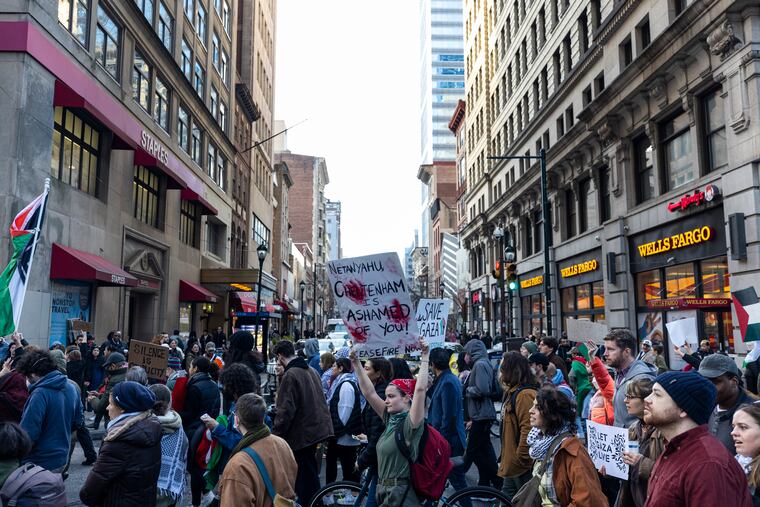Antisemitic incidents have soared in Philly — but counting pro-Palestinian rallies draws rebuke
The Anti-Defamation League labeled 22 protests in Philadelphia last year as antisemitic incidents due to certain slogans that were used.

The nation’s largest Jewish civil rights advocacy group last week reported a more than 820% uptick in antisemitic incidents in Philadelphia between October and December, reflective of a nationwide increase since the Israel-Hamas war began. But a report published Tuesday by the Anti-Defamation League that collated attacks against Jewish people and institutions is facing criticism over a new metric the organization included in its definition of antisemitism: protests critical of Israel.
The organization was most alarmed at the increase in vandalism and harassment targeting Jewish and Israeli people, as well as businesses and cultural centers, said Abbey Krain, senior associate regional director at ADL Philadelphia.
ADL documented 84 cases of antisemitism in Philadelphia last year — including 43 cases of alleged harassment and 17 cases of vandalism. Three-quarters of those provisional reports occurred between Oct. 7 and Dec. 20, a ten-week period starting with the onset of war that saw just seven total incidents the year prior.
The ADL’s tally included 22 anti-Israel rallies in Philadelphia that the organization said included “antisemitism, anti-Zionism or support for terrorism.” (Such rallies were also included in the ADL’s nationwide survey of antisemitic incidents, which reported a 361% increase for the Oct. 7-to-Dec. 20 period.)
“Emotions are running really deep and very raw,” Krain said. “But there’s simply no excuse for hate, for antisemitism, none of this is normal … the stories are terrifying.”
The New York-based ADL has tracked hate incidents against Jewish people since the 1970s, including assaults, intimidation, harassment, threats, and acts of vandalism, and Krain said the recent surge in reported antisemitism is the most significant in over a decade. While the organization has expanded its criteria in the past, the inclusion of protest speech marks a significant broadening, and comes at a time of heated debate about slogans that have been used within the pro-Palestinian movement for decades.
The Oct. 7 Hamas attack and Israel’s ongoing siege in Gaza has brought a rise in both antisemitic and Islamaphobic attacks across the nation, ranging from the defacing of mosques and synagogues to the shooting of a Haverford College student and his two Palestinian-American friends in Vermont.
A case list provided by the local ADL chapter offers new details about the incidents targeting Jewish people in the region.
At an unidentified school in Ambler, a student allegedly ripped off a Jewish student’s Star of David necklace, said “I hate Jews,” and called the student an antisemitic slur. In another case, a Jewish family in Philadelphia reported receiving a personally addressed letter in the mail that included threats and antisemitic language.
A Jewish day school in Center City was graffitied with pro-Palestinian messaging in December. Over a dozen Jewish institutions were targeted with a bomb threat hoax around the same time. Images of swastikas have appeared at schools, on businesses, and in public spaces more often.
In an interview, Krain singled out the Philly Palestine Coalition’s boycott of Jewish and Israeli-owned businesses that led to a viral demonstration outside a Center City falafel shop last month — one of the 22 local protests that the ADL included in its data.
Asked about its methodology for labelling a protest antisemitic, Krain said the ADL counted any demonstration featuring pro-Palestinian chants such as “globalize the intifada, “by all means necessary,” “Zionism is terrorism,” and “from the River to the Sea, Palestine will be free.”
Krain said the organization tried to be selective about the rhetoric it deemed hostile or prejudicial toward Jews. Those messages, she said, were essentially “a call for violence against the Jewish people,” though many Palestinian activists refute that assessment and characterize the messages as a rallying call for permanent statehood and an end to Israel’s occupation. Moreover, activists argue that criticisms of the Israeli government and Zionism, or the belief the Israel is the nation state of the Jewish people, should not be conflated with prejudice toward Jewish people.
Israel’s ongoing military campaign in Gaza has given rise to hundreds of protests across the United States. The Philly Palestine Coalition — an activist network that includes pro-Palestinian Jewish groups like the Jewish Voice for Peace — has staged or promoted over 70 demonstrations since the war began.
Noor Qutyan, an organizer with the coalition, said the ADL’s definition sets a dangerous precedent that could lead to harmful repercussions for Palestinians as well as for others who are critical of Israeli policy.
Qutyan contended that the ADL’s changes would “result in a rise of Islamophobia as well as Palestinians and their supporters getting doxxed, fired, and punished for speaking up for human rights.”
Marwan Kreidie, founder of the Arab American Development Corp., said there have been internal deliberations among local leaders in the Arab community about public messaging at demonstrations. But he said blacklisting slogans was a slippery slope that would lead to further censorship of pro-Palestinian language in the public sphere.
“I’m someone who’s been involved in human rights and anti-discrimination my whole life and I take antisemitism very seriously,” he said. “But to conflate antisemitism with anti-Zionism and criticism of Israel cheapens antisemitism.”
Kreidie noted that the debate around controversial expressions is heated now, but hopes the debate can continue at a calmer time.
At the moment, he said, he’s steering clear of phrases like “from the River to the Sea” at his organization’s events, but would not censor another speaker.
“We have to focus on Palestine and work together as a community,” he said.